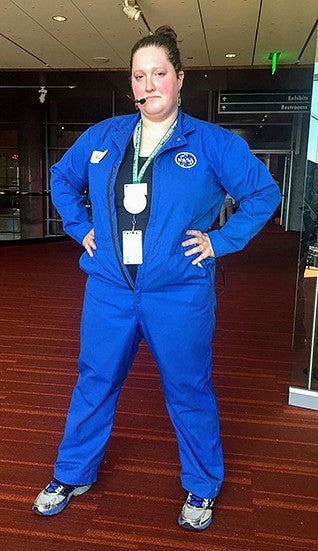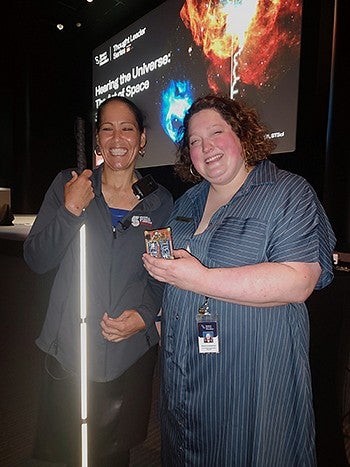
Learn more about Special Education program alumna Rachel Schwartzman, MS, Accessibility and Inclusion Specialist, Space Center Houston, through our Alumni Spotlight series
"I bring my lived experience, a fierce sense of justice, and a deep curiosity to what I do. I want people to feel like they belong wherever I’m helping shape programs or spaces, and I’ll always be a lifelong learner, continuing to grow alongside the disability community I advocate for. No one should have to fight to belong in a space that's meant for learning and wonder." – Rachel Schwartzman
Meet Rachel Schwartzman, a passionate advocate for inclusive learning who’s built a career at the intersection of museums, nonprofits, and accessibility. After earning her master's from the Special Education program, Rachel now brings her expertise to Space Center Houston—designing imaginative, inclusive guest experiences and accessibility policies that ensure everyone feels welcome.
Growing up with a learning disability, Rachel found empowerment in hands-on, informal learning environments like museums. That personal connection drives her mission to make educational spaces more inclusive for learners of all ages and abilities.
What has your career path looked like?
My career has primarily centered around museums and nonprofit work, where I’ve had the privilege of combining education, accessibility, and public engagement in really meaningful ways. I’ve always been drawn to informal learning spaces and how they can spark curiosity in people of all ages and abilities.
Even during periods when I stepped away from museum work, like during the height of the COVID-19 pandemic when I joined Megastar, I continued to build on my core skills: team leadership, clear communication, and designing inclusive experiences. Working in the corporate world after spending most of my time in nonprofits was an interesting shift, especially having just completed my graduate certificate in Nonprofit Management from the University of Oregon. It gave me a new perspective on organizational structure, resource allocation, and the universality of mission-driven work, even in unexpected spaces.
Now, in my role at Space Center Houston, I’ve been able to bring all of those experiences together. Whether it’s training staff, rethinking guest experiences, or shaping accessibility policy, my path has been all about making learning spaces more inclusive, imaginative, and impactful.
What inspired you to focus on creating inclusive and accessible programming?
I have a learning disability that was often overlooked or minimized when I was growing up. In school, I was sometimes shamed for asking too many questions or for needing to learn through touch and movement. But museums were different—they were places where I could ask questions, interact with the world in a hands-on way, and follow my curiosity without judgment. They helped me feel like I belonged.
As I began working in museums myself, I saw both the magic they could offer and the ways they still fell short of welcoming every learner. I realized how many kids, like me, were still being left out simply because their needs weren’t being considered. And not just kids, adults with disabilities are also too often underserved in museum spaces. This work is for them too.
I bring my lived experience, a fierce sense of justice, and a deep curiosity to what I do. I want people to feel like they belong wherever I’m helping shape programs or spaces, and I’ll always be a lifelong learner, continuing to grow alongside the disability community I advocate for.

How did the Special Education (SPED) program prepare you for your career?
The SPED program at the University of Oregon helped me continue learning how to think, how to approach different kinds of learners, different subjects, and different educational environments with flexibility and curiosity. I was one of a small number of students in the non-licensure track focusing on museum education, and I quickly became known as “the museum girl”, a title I wore proudly. Even though my path was a little different, my cohorts embraced me and my informal education perspective, which made a huge difference in how supported I felt.
My professors were especially impactful because they let me shape assignments around museum education, allowing me to build real-world applications into my coursework. One of them, Chris Knowles, became a mentor and later a co-author on my first publication after I graduated. As someone with a learning disability, the idea of publishing felt daunting, but Chris helped break it down into manageable pieces. It’s a perfect example of a professor practicing what they preach—supporting my growth without doing the work for me or making me feel less-than.
Academically, the program also gave me tools I still use today. For example, I recently adapted a version of PBIS (Positive Behavioral Interventions and Supports) for our space camps at Space Center Houston, something I learned in my SPED classes. Because my professors encouraged me to stay true to my informal education path, I was able to really understand how to take those strategies and make them work in museum-based learning environments.
How has your personal story shaped your commitment to this important work?
My personal experiences have always been the lens through which I see the work. Growing up with a learning disability shaped how I understood access, inclusion, and the power of feeling seen. That lived experience keeps me grounded, fuels my sense of justice, and reminds me why this work matters, because no one should have to fight to belong in a space that’s meant for learning and wonder. It’s not just professional for me, it’s personal.
